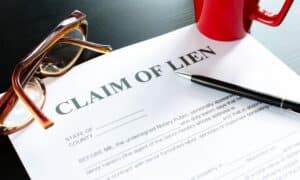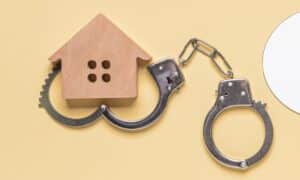The process of selling a property can be a bit complex in some cases, given the financial and legal considerations involved with real estate transactions.

Even more challenging is when a house comes with a lien. In fact, many homeowners end up postponing or even canceling the sale due to the complexities posed by liens on a house.
So what are the different types of liens on New Hampshire property? And can a house be sold with a lien on it in New Hampshire?
We’ll answer all this and more. By the end of this guide, you’ll be an expert on selling a house with a lien in New Hampshire.
What Is a Property Lien New Hampshire?
Broadly speaking, a lien is a legal tool used by creditors to protect their financial interests. To be more precise, it is a legal claim or right against an asset that is used to satisfy a debt.

Therefore, New Hampshire house liens are used by creditors to encourage prospective property buyers and homeowners to clear any existing financial obligations. According to Forbes, liens can be filed by different types of creditors like banks, mortgage lenders, contractors, and others who are owed money by the property owner.
How Do Liens Work New Hampshire?
If the property owner fails to clear an existing debt, the creditor can seek repayment of this debt by filing a lien. When it is filed, the creditor gets the lien recorded in the local county recorder’s office, thereby making it a public record.
In that context, the one who files the lien is known as the lien holder, and they get a legal right to a piece of the property once the lien is approved. Most liens are approved by the New Hampshire court, but in some scenarios, the homeowner may voluntarily grant the lien.
For example, if you have failed to clear the mortgage payments on your property, the lender may file a lien against the property. When the court approves the lien, the mortgage lender will have the right to a portion of your New Hampshire property. If you still fail to clear the debt after that, the lender will be able to seize the property and sell it to recoup some of their losses.
On that note, the borrower or property owner will not have a clear title if a lien is placed on the property they own. In other words, the owner will lose the ability to sell the property independently, which means that they will need consent from the lien holder before doing so.
Besides, it can make it difficult to subdivide the house. It can also prevent the owner from getting a mortgage until the lien is resolved.
Types Of House Liens New Hampshire
Now that you have a basic idea of what liens are and how they work let’s discuss the different types of liens in New Hampshire. Below, we have mentioned some of the most common liens used by creditors today.
1. Judgment Lien
Also known as a judicial lien, this is a type of lien that is placed on the property after a lawsuit. When the property owner fails to pay the creditor, the latter may sue the former in a court of law. If the court judgment goes against the owner, they will be instructed to clear the debts of the winner within a given time.
However, if the owner still fails to settle the financial obligations, the creditor can file a judgment lien against the New Hampshire property. By doing that, they can liquidate the property asset and recoup some of the losses.
2. Mortgage Lien
The mortgage lien is possibly the most common type of lien placed on properties. As you can guess from the name, mortgage liens are used by mortgage lenders whenever they issue a loan against a property.
In that context, it is a voluntary lien granted by the property owner when they finalize the loan and sign all the relevant documents to close on the property. Basically, the lien allows the lender to use the property as collateral. If the New Hampshire homeowner fails to complete their mortgage loan repayments, the lender can seize and sell the house to recoup the loan.
3. Property Tax Lien
Commonly referred to as a tax lien, it is placed on a New Hampshire house when the homeowner fails to pay the real estate tax and other property taxes. This lien is also very common, especially in the domain of taxation, and it takes priority over other types of liens placed on a New Hampshire house.
Property tax liens are used by relevant tax authorities or the government. It enables them to seize the asset from the owner, especially if they have failed to pay property taxes for a long time. By selling the property, the government recoups the unpaid taxes, along with any existing interests and penalties.
4. IRS Tax Lien
The Internal Revenue Service (IRS) tax lien is very similar to the property tax lien since it is also used by the government. However, IRS liens are issued when the owner fails to pay income taxes on time, which distinguishes it from property tax liens.
Such a lien is issued by the IRS as a means to encourage the owner to clear any unpaid taxes. If they are unable to do that, the lien enables the IRS to foreclose the property, thereby helping to address any financial obligations.
5. Mechanic’s Lien
When the property owner hires contractors to get work done on their property and fails to pay them on time for their services, this type of lien is used. These contractors include not only mechanics but also material suppliers, designers, architects, engineers, and other similar people.
6. Child Support Lien
The child support lien is placed on a property when the owner fails to pay child support ordered by a court of law. In this regard, it is very similar to a judgment lien since it is issued on the basis of a court judgment.
7. HOA Lien
A Homeowners Association is an organization that conducts periodic assessments and maintenance of community-owned properties. And in order to do these tasks, the HOA collects fees from registered property owners. However, if an owner fails to pay the fees due to the HOA, then this lien is issued.
HOA liens are issued even if the owner has cleared all his tax debts and other financial obligations, which means that it is used independently of the other involuntary liens. It allows a New Hampshire HOA to foreclose the property and recoup some of the financial dues. Luckily, the severity of HOA liens is usually less compared to the other types of involuntary liens discussed so far.
8. Bank Lien
If you have taken a bank loan to purchase the property, and have failed to clear the debt owed, then this lien will be placed on your New Hampshire property by the bank. It is functionally similar to a mortgage lien since it allows the bank to use your property as collateral. If your dues keep piling up, the bank will use this lien to seize your property and sell it.
Can You Sell a House with a Lien On It New Hampshire?
It is now time to address the primary question of this discussion – can you sell a New Hampshire home that has one or more liens placed on it? Well, the answer to that question is – yes, you can definitely sell a house with a lien in New Hampshire (or any residential property).
However, there are some things that you need to consider here. For starters, you will need to find out if your property has any liens placed on it, what type they are, and how many of those are active.
Next, you will need to address the liens before proceeding with the property sale. When a New Hampshire house with a lien is put on sale, the title company requires the owner to clear the outstanding debt and satisfy the lien before closing on the sale. If you don’t do that, the sale won’t be closed, which will result in unnecessary delays.
Yes, we know that it may sound a bit challenging, especially if you are going through financial trouble, but that’s how the regulations are at the moment. After all, if the owner does not have a clear title on the property, then most buyers will feel skeptical about buying a property with a lien.
Fortunately, there are some cases when buyers may agree to buy a home with a lien. In such a situation, you will have to use the proceeds from the sale to clear out the lien.
If you include a clause in the closing agreement that allows you to do that, then the buyer can be convinced to go ahead with the closing process. The only drawback is that you won’t be able to use any of the money for your own needs.
How To Sell a New Hampshire House With a Lien?
In order to sell a New Hampshire house with one or more liens, you can follow the procedure we have discussed in this section. Do note that the steps mentioned below will require you to settle all the existing liens before proceeding with the sale.
1. Find The Existing Liens On The Property
We have briefly mentioned in the previous section that you need to find the liens on your New Hampshire property before proceeding with the sale. This is actually the first step in selling such a house.
In order to check if your property has a lien, you can do a title search. It refers to the process of examining public records to verify the legal ownership and titles of a property. Most of these documents, ranging from land records, deeds, court judgments, and so on, can be accessed at the county records office.
You can conduct a property lien search on your own, but it may take a long time to complete the process. That is why we recommend getting a New Hampshire title company, who can get this job done in exchange for a small fee.
According to a report by the American Land Title Association, these companies uncover title issues in around 25% of title searches. This means that one in every four properties has liens placed on it.
In any case, once the liens have been found, you can proceed to the next step, which we have discussed below.
2. Determine The Legitimacy Of The Lien
Sometimes, the lien placed on your property may not be legitimate or accurate. So, it is advisable to conduct a proper evaluation of the lien to determine its validity.
You can seek help from a New Hampshire real estate attorney or advisor to address such an issue. If they find that there is a fraudulent lien, they can help you contest the outstanding debts, thereby freeing you from the financial burden. Furthermore, if there are any inaccuracies with the lien, such as old or outdated information, then they can be fixed as well.
3. Take Care Of The Lien
After you have determined the legitimacy of the liens, you will need to deal with them quickly. There are three ways to achieve this goal – paying off the lien, transferring it to another property, or negotiating with the creditor.
Paying off a lien is the simplest and most effective solution, where you settle the lien upfront by clearing all the dues. If you owe a small amount of money to a creditor, then this will be easy to do.
However, if you owe a large sum of money, then this won’t be a feasible solution. In that scenario, you can try to negotiate with the creditor to address the issue. With the help of a real estate attorney, you can talk with the creditor to develop an alternative payment plan or come to an agreement to reduce the money owed.
Alternatively, you can transfer the outstanding liens to another property that you own. If you can successfully transfer the liens this way, the house will get a clean title, which will make it easy to sell. That said, this approach cannot be used if there aren’t any other owned properties.
4. Obtain Lien Termination
If you have cleared all the liens on the property, you need to obtain valid documentation for lien discharge that proves the same.
This documentation comes in the form of a payoff letter or a lien release form issued by the creditor. Both of these documents state that the owner has cleared all the unpaid debts on the property and has a clean title on it. Once you obtain that, you’ll need to submit it to the county clerk at the records office to terminate the lien.
5. Proceed With The Sale
After the lien has been settled, you can make preparations to sell the house. You can start by listing it for sale on the local New Hampshire real estate market. Then, you need to come up with a proper marketing strategy to attract buyers.
You can consult a New Hampshire real estate agent to help with the transaction. Likewise, talk with all the prospective buyers to identify the best one. When all that is done, you can finally close the deal and sell the house.
Alternatively, you could sell the house to a qualified cash home buyer for an instant cash offer – skipping the showings, staging, fees, and hassles involved with listing on the New Hampshire MLS. If they work as fast as us, a top company should be able to close in 7 days or less (any house, any condition!).
6. Alternative Strategy: Use The Sale Proceeds To Clear The Liens
If you choose to use the proceeds from the sale to clear the outstanding debts, then the process will be the same up to the second step. You won’t need to settle the debts like we have suggested in the third step, though.
Instead, you can consult with your real estate agent and negotiate with the buyer to include an extra clause in the purchase agreement. This clause will allow you to use the proceeds from the sale to settle the liens on the New Hampshire house. However, we would advise using this strategy only if you owe a large amount of money.
How Do Liens Impact a House Sale New Hampshire?
The presence of a lien on your New Hampshire home can affect its sale in several different ways, listed below.
1. Selling To Retail Buyers Can Be Challenging
When there is a lien on your home, finding conventional retail buyers can be difficult and time-consuming.
This is especially true if there is more than one involuntary lien placed on the house. Also, if the debt owed is a large one or it includes unpaid federal taxes, it can put off potential retail buyers, who might consider the property to be a risky investment.
2. You May Get Cash Buyers
While regular retail buyers may be difficult to find, there will be plenty of cash buyers willing to purchase the home with liens. Cash buyers include real estate investors and house flippers who specialize in dealing with such properties. Instead of buying the home from auctions, they will purchase it directly from the owner.
3. You May Get Less Money
It goes without saying that you may get less when selling a New Hampshire house with liens than you would in a standard lien-free home sale. After all, you need to spend a lot of money to clear the debts, which will eat into the profits. Moreover, the buyer may not be willing to pay a high price for the property.
So, Can a House Be Sold With a Lien On It New Hampshire? (Yes!)
Selling your New Hampshire house with liens can be difficult, but not impossible.
As long as you follow the procedure here, you won’t face any major issues in selling such a house. Also, we would strongly advise seeking help from a New Hampshire real estate attorney who can knowledgeably handle the legal side of things for you.
You can also contact us at Priority Home Buyers anytime by phone at 877-775-0988 for a fast and free consultation. Our in-house lawyer team can tackle your liens head on, and our New Hampshire real estate experts can provide a no-obligation, cash home offer for you to consider. That’s right – we will buy the house from you as-is, with liens on it – and you walk away with cash!
We are here to assist with the next steps going forward, and would love just to talk! We’re looking forward to your call :)
New Hampshire Seller Resources













